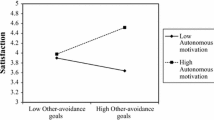Abstract
This study examined the interactive effects of competition, rewards, and goal difficulty on task performance and goal commitment. Students were assigned to one of eight experimental conditions and participated in a computerized anagram solution task. Rewards significantly increased performance, especially along with difficult goals. Competition was not found to have an effect on goal commitment or task performance, and goal difficulty increased performance although the results did not reach statistical significance. Goal commitment was shown to have a direct effect on task performance as opposed to a moderating role in the goal level-task performance relationship. A discussion of the findings and suggestions for further research are included.
Similar content being viewed by others
References
Ackerman, P.L. (1987). Individual Differences in Skill Learning: An Integration of Psychometric and Information Processing Perspectives.Psychological Bulletin, 102, 3–27.
Cellar, D.F., & Barrett, G.V. (1987). Script processing and intrinsic motivation: The cognitive sets underlying cognitive labels.Organizational Behavior and Human Decision Processes, 40, 115–135.
Earley, P.C. (1985). Influence of information, choice, and task complexity upon goal acceptance, performance, and personal goals.Journal of Applied Psychology, 70, 481–491.
Erez, M., & Zidon, I. (1984). Effect of goal acceptance on the relationship of goal difficulty to performance.Journal of Applied Psychology, 69, 69–78.
Hollenbeck, J.R., & Klein, H.J. (1987). Goal commitment and the goal setting process: Problems, prospects and proposals for future research.Journal of Applied Psychology, 72, 212–220.
Hollenbeck, J.R., Williams, C.R., & Klein, H.J. (1989). An empirical examination of the antecedents of commitment to difficult goals.Journal of Applied Psychology, 74, 18–23.
Huber, V.L. (1985). Effects of task difficulty, goal setting, and strategy on performance of a heuristic task.Journal of Applied Psychology, 70, 492–504.
Kanfer, R. & Kanfer, F.H. (1991). Goals and self-regulation: Applications of theory to work setting. InAdvances in Motivation and Achievement, JAI Press.
Klein, H.J. (1989). An integrated control theory model of work motivation,Academy of Management Review, 14(2), 150–172.
Komaki, J., Barwick, K.D., & Scott, L.R. (1978). A behavioral approach to occupational safety: pinpointing and reinforcing safe performance in a food manufacturing plant.Journal of Applied Psychology, 63, 434–445.
Latham, G.P., & Baldes, J.J. (1975). The “practical significance” of Locke's theory of goal setting.Journal of Applied Psychology, 60, 122–124.
Leifer, R., & McGannon, K. (1986). Goal acceptance and goal commitment: Their differential impact on goal setting theory. Presented at Academy of Management meeting.
Locke, E.A. (1968). Toward a theory of task motivation and incentives.Organizational Behavior and Human Performance, 3, 157–189.
Locke, E.A., & Latham, G.P. (1990).A theory of goal setting and task performance. Englewood Cliffs, NJ: Prentice Hall.
Locke, E.A., Latham, G.P., & Erez, M. (1988). The determinants of goal commitment.Academy of Management Review, 13, 23–39.
Locke, E.A., & Shaw, K.N. (1984). Atkinson's inverse-U curve and the missing cognitive variables.Psychological Reports, 55, 403–412.
Mento, A.J., Steel, R.P., & Karen, R.J. (1987). A meta-analytic study of the effects of goal setting on task performance: 1966–1984.Organizational Behavior and Human Decision Processes, 39, 52–83.
Mitchell, T.R., Rothman, M., & Linden, R.C. (1985). Effects of normative information on task performance.Journal of Applied Psychology, 70, 48–55.
Mowen, J.C., Middlemist, R.D., & Luther, D. (1981). Joint effects of assigned goal level and incentive structure on task performance: A laboratory study.Journal of Applied Psychology, 66, 598–603.
Mueller, M.E. (1983). The effects of goal setting and competition on performance: A laboratory study. University of Minnesota, Unpublished master's thesis.
Nordstrom, R., Rucker, G., & Hall, R.J. (1988). Performance management in city government: A case study.Public Personnel Management, 17, 159–165.
Porter, L.W. & Miles, R.E. (1974). Motivation and management. In J.W. McGuire (Ed.),Contemporary Management: Issues and Viewpoints Englewood Cliffs, N.J.: Prentice-Hall.
Sales, S.M. (1970). Some effects of role overload and role underload.Organizational Behavior and Human Performance, 5, 592–608.
Shalley, C.E., Oldham, G.R., & Porac, J.F. (1987). Effects of goal difficulty, goal-setting method, and expected external evaluation on intrinsic motivation.Academy of Management Journal, 30, 553–563.
Somers, R.L., Locke, E.A., & Tuttle, T.C. (1985–86). Adding competition to the management basics: An application in the defense department.National Productivity Review, Winter, 7–21.
Steers, R.M. & Porter, L.W. (1987).Motivation and Work Behavior.Fourth Edition, New York: McGraw-Hill.
White, S.E., Mitchell, T.P. & Bell, Jr., C.H. (1977). Goal setting, evaluation apprehension, and social cues as determinants of job performance and job satisfaction in a simulated organization.Journal of Applied Psychology, 62, 665–673.
Author information
Authors and Affiliations
Additional information
DePaul University
Rights and permissions
About this article
Cite this article
Allscheid, S.P., Cellar, D.F. An interactive approach to work motivation: The effects of competition, rewards, and goal difficulty on task performance. J Bus Psychol 11, 219–237 (1996). https://doi.org/10.1007/BF02193860
Issue Date:
DOI: https://doi.org/10.1007/BF02193860




